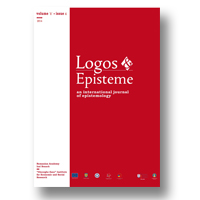|
research articles |
|
1.
|
Logos & Episteme:
Volume >
14 >
Issue: 4
Daniele Bertini
The Refutation of Intentionalism
abstract |
view |
rights & permissions
| cited by
My purpose is to refute the intentionalist approach to perception. Drawing from mainstream literature, I identify a principle on which any version of intentional theory relies. My paper is a detailed attack on the truth of the principle. In the first section I will introduce terminology and will taxonomize various statements of the intentional view. In the second section I will briefly outline a sketch of the skeletal intentionalist theory that develops from the assumption of the principle alone. Then, in the third section, I will advance my reasons against this theory. In the fourth section, I will set forth anintuitive and definitive counterexample to the adequacy of the principle of intentionalism to accounting for ordinary perception. Moving from this, in the fifth section, I will provide some reasons explaining why intentionalism is condemned at being unsuccessful. Finally, in the last section of the paper, I will give my conclusions.
|
|
|
|
|
2.
|
Logos & Episteme:
Volume >
14 >
Issue: 4
Mark Anthony L. Dacela, Napoleon M. Mabaquiao, Jr.
Collective Epistemic Traits as System Properties
abstract |
view |
rights & permissions
| cited by
The essay deals with the issue of how a non-summativist account of collective epistemic traits can be properly justified. We trace the roots of this issue in virtue epistemology and collective epistemology and then critically examine certain views advanced to justify non-summativism. We focus on those considered by Fricker, including Gilbert’s concept of plural subjects, which she endorses. We find her analysis of these views problematic for either going beyond the parameters of the summativism-nonsummativism debate or contradicting common intuitions about epistemic trait ascriptions. As an alternative, we advance the idea that collective epistemic traits are system properties; or that epistemic traits act as system properties when attributed to collectives taken in their own right. Working as a system, the individual members of a collective perform their designated roles or tasks in coordination and cooperation with each other to achieve theirjoint intentions. Being attributes exclusive to systems, collective epistemic traits cannot, therefore, be attributed in the same respect to the individuals comprising these systems, thereby blocking any summative account of these traits. This model also easily sidesteps the problems besetting Fricker’s preferred one.
|
|
|
|
|
3.
|
Logos & Episteme:
Volume >
14 >
Issue: 4
Mohammadreza Esmkhani
The Post-epistemological Inquiry and the Ultimate Fate of Philosophy.:
A Critical Discussion
abstract |
view |
rights & permissions
| cited by
This essay examines the different fates of philosophy in Bloor’s and Rorty’s post-epistemological inquiries, tracing their sharp disagreement to their distinct conceptions of ‘naturalism’ and ‘language.’ To this end, the first section outlines their main reasons for overcoming the epistemologically-centered philosophy, as well as theirreassessments of key concepts such as objectivity. The second section draws a comparison between their proposed post-epistemological inquiries, i.e., Bloor’s empirically-informed ‘sociologism’ and Rorty’s pragmatist ‘conversationalism,’ emphasizing that while the former implies the ‘end’ of philosophy in a scientific culture, the latter proposes a ‘new role’ for philosophy in a conversational culture. The third section shows how, in contrast to Bloor’s dismissive attitude toward philosophy and the potential of intervocabulary discourse, which can chiefly be attributed to his scientific naturalism and his Wittgensteinian rule-governed view of language, Rorty’s conception of philosophy as a cross-cultural, conversational practice is enabled and sustained by his non-scientific naturalism coupled with his Davidsonian communicative view of language. Finally, as opposed to Rorty’s attempt to completely dismantle the ‘epistemology industry,’ the fourth section briefly explores the extent to which Bloor’s ‘theory’-oriented viewpoint is still affected by it.
|
|
|
|
|
4.
|
Logos & Episteme:
Volume >
14 >
Issue: 4
Nicolas C. Gonzalez
Identification and Appearance as Epistemic Groundwork
abstract |
view |
rights & permissions
| cited by
The idea that appearances provide justifications for beliefs—the principle of phenomenal conservatism—is self-evidently true. In the case of cognitive penetration, however, it seems that certain irrational etiologies of a belief may influence the epistemic quality of that belief. Susanna Siegel argues that these etiologies lead to ‘epistemic downgrade.’ Instead of providing us with a decisive objection, cognitive penetration calls for us to clarify our epistemic framework by understanding the formative parts of appearances. In doing so, the two different but inseparable ideas of sensation and intellection provide us with a basis of our appearances. These appearances, in turn, provide us with the objective evidence needed to test our judgements. Thus, the extra-sensory concepts of intellectual identification and the appearances they help form become an epistemic groundwork.
|
|
|
|
|
|
|
5.
|
Logos & Episteme:
Volume >
14 >
Issue: 4
Notes on the Contributors
view |
rights & permissions
| cited by
|
|
|
|
|
|
|
6.
|
Logos & Episteme:
Volume >
14 >
Issue: 4
Notes to Contributors
view |
rights & permissions
| cited by
|
|
|
|
|
|
|
7.
|
Logos & Episteme:
Volume >
14 >
Issue: 4
Logos & Episteme: Aims & Scope
view |
rights & permissions
| cited by
|
|
|
|
